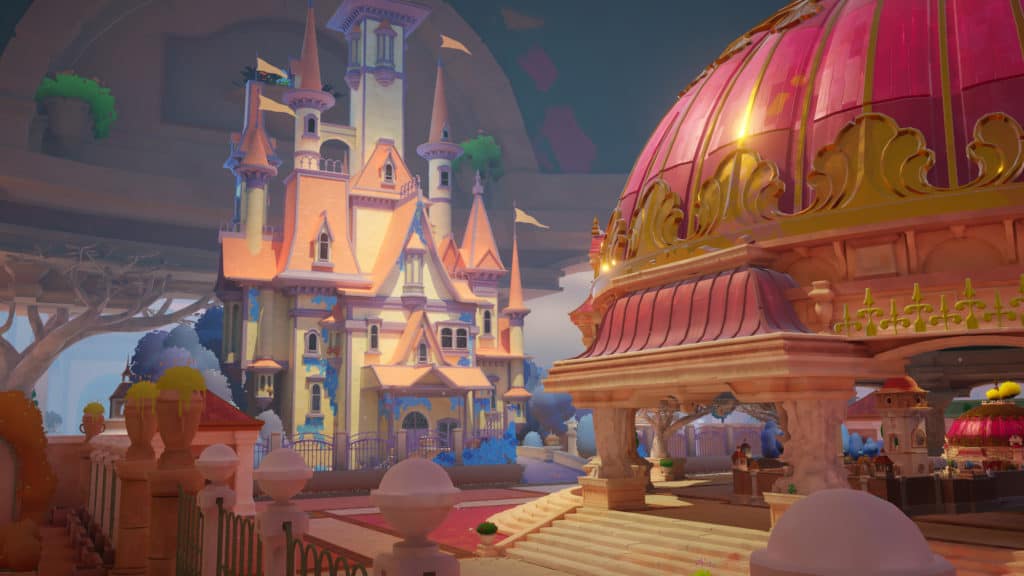Video Gamer is reader-supported. When you buy through links on our site, we may earn an affiliate commission. Prices subject to change. Learn more
Maquette tells the story of two lovers, Michael and Kenzie, but I’m not sure why. It goes like this. They meet in a coffee shop, she spills coffee, narrowly missing his sketchbook, they laugh; they date, move in together, and go painting in the park; they drink wine and drift apart, frictions deepen into fractures, they break up. Fair enough, but why all the puzzles? The game brims with perspective-based conundrums that have you altering the size of objects—a key, for example—dropping them into a model-village version of reality and ducking as they come clanging down outside, larger than before. Maybe it’s a metaphor for those fights where something small gets blown out of proportion. Or the way our carefully enamelled inner lives can seem like the whole world. Whatever the case, the narrative soaks awkwardly into play, like coffee into a sketchbook.
To be fair, a crumbling romance isn’t exactly an ill-fitting frame for this soggy clash; mechanics and themes have a nasty habit of undermining each other, like an embittered couple at a dinner party. But the problem with Michael and Kenzie is that I spent most of the time praying for the crumble. Their initial encounter feels forced and clumsy—a meet-brute, as it were—as the pair grind through a cloying script (the story was written by director Hanford Lemoore). The first declaration of love is more of a slow drip: “I don’t want you to say something you are not ready to say.” “But I do want to say it.” And anyone who sums up their time with another soul by saying, “Our first year together was epic,” as Michael does, is deserving of nothing but our ire. What’s more, the most perplexing mystery—more than the majority of the puzzles—is why Bryce Dallas Howard and Seth Gabel, who voice the two leads, and who happen to be partners in real life, should fail to summon a genuine spark.

Where Maquette does come alive is in the moments when the last thing on your mind is love, and instead you’re lugging a pink crystal through a corresponding force field, the better to poke a key through a hole in the wall, to be collected, in miniaturised form, and slotted into the lock of a mechanical door. Credit must go to the developer, Graceful Decay, for conjuring a series of puzzles that specialise in what you might call long-circuiting your brain. They demand that you rewire your thinking around what can be retrieved, shrunk, or expanded, by looping back to the scaled-down replica in the middle of the main chamber. Only once was this central conceit the cause of frustration, as I glared through a haze of caffeine and clenched teeth at one particularly stubborn problem—one of those that look simple the next day, once the steam evaporates.
Maquette is, for most of its runtime, a pleasant distraction. The art direction, by Tim Doolen, favours flat, dusty shades, punched through by pink domes and golden spires, and the soundtrack is warmed by the acoustic crooning of various indie bands. The atmosphere is mellow; I was never so much hungry to press on as simply happy to. I would describe it with that most damning of adjectives: it is interesting, which is often a way of sidestepping the yawning mineshaft where the fun should be. But that isn’t the case here. The puzzles compel, while the narrative stalls, and there is something worthy in that mismatch. I only wish that the breakup at its core yielded something worth holding on to.

Michael’s thoughts appear throughout, as glowing white notes glued onto walls; towards the end, he reflects on his time with Kenzie: “I second guessed everything we’d done,” he says, “I asked myself whether we were ever a good fit…” This doubt-shaded moment reminded me of Braid, another game that explored a broken relationship, but which did so in the language of its medium. That game’s moment of epiphany came as you reversed the flow of time, turning a platforming attempt at saving your beloved into a chase, as she tried to slip your clutches. In the tightly calibrated churn of its mechanics, the truth leaked out. No such revelations await in Maquette. The buildings are given to a graceful decay, leached of colour and riven with cracks, as Michael trudges through the caverns of his own gloom towards the light. And perhaps towards another coffee shop. As it happens, he and Kenzie just didn’t work out. Puzzle solved.
Developer: Graceful Decay
Publisher: Annapurna Interactive
Available on: PS5 [reviewed on], PS4, PC
Release Date: March 2, 2021
To check what a review score means from us, click here.

